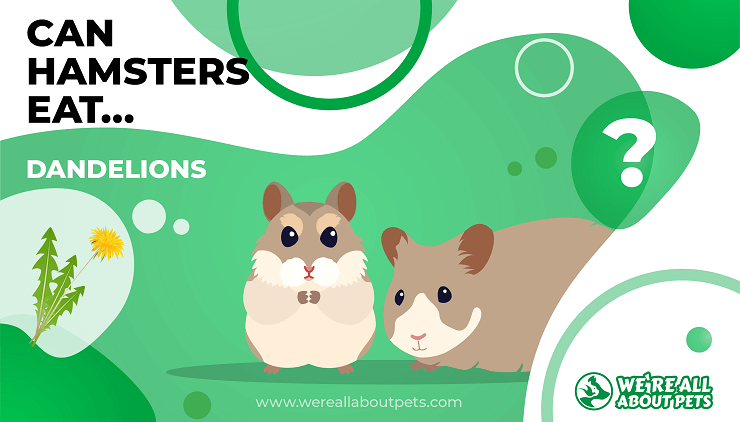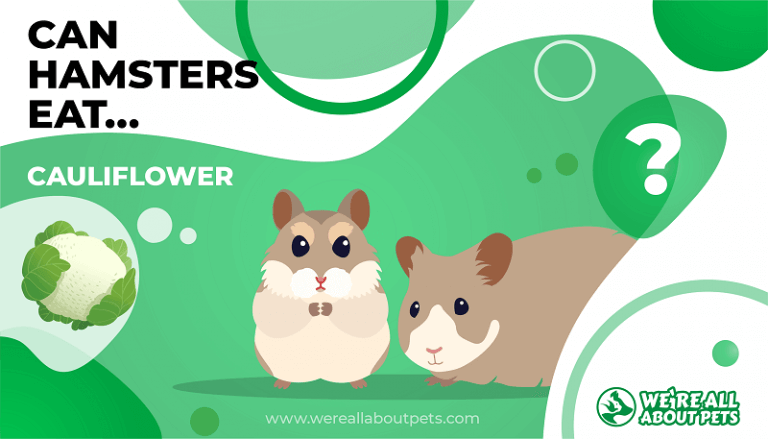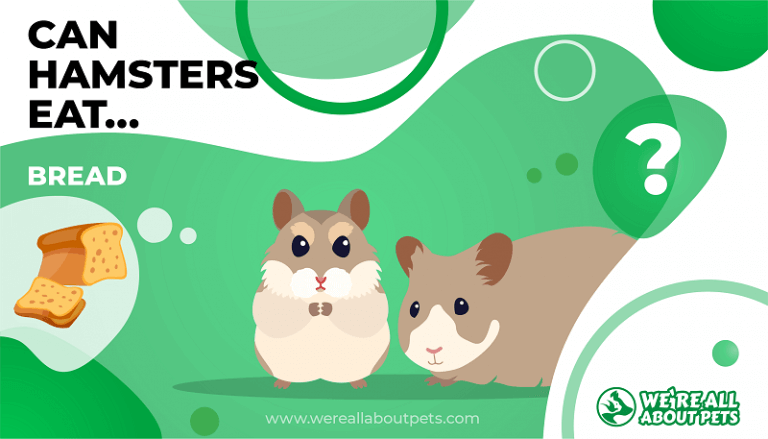Can Hamsters Eat Corn?
This page contains affiliate links. We may earn money or products from the companies mentioned in this post through our independently chosen links, which earn us a commission. Learn More
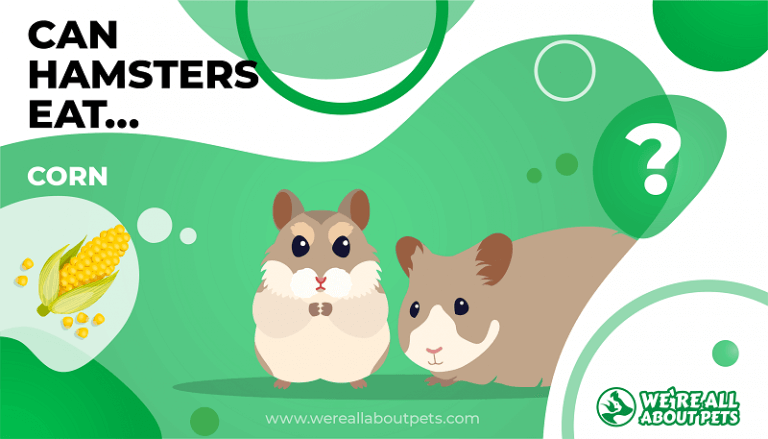
Buttery corn on the cob, crunchy popcorn, and more: We humans love corn, and it’s an important food in many cultures. But is this a treat we should share with our pets?
As it turns out, the short answer is yes. It’s OK to give a hamster a bit of corn, but you’ve really got to take a cautious approach when it comes to how much and how often you offer this yummy snack.
Don’t worry: You won’t be left in the dark!
We’re about to give you the full scoop on corn for hamsters.
Corn Nutrition Stats
Corn isn’t a dieter’s dream. In fact, it’s higher in calories and sugar than most other veggies are. This isn’t a reason to avoid it though, unless you’re on a low-carb diet!
A large, satisfying ear of sweet corn offers about:
- 125 calories
- 5 g carbohydrates
- 3 g fiber
- 9 g protein
- 5 g fat
Corn Nutritional Facts

Corn isn’t considered to be a superfood, but it’s got plenty of nutrients that are good for you (and your hamster friend!)
That same big, yummy ear of sweet corn gives you approximately:
- 310 IU vitamin A
- 3 mcg folate
- 3 mg vitamin C
- 9 mg niacin
- .3 mg thiamine
- 5 mg phosphorus
- 7 mg magnesium
- .2 mg manganese
- .7 mg zinc
- .1 mb vitamin B6
- .5 mg iron
- .1 mg riboflavin
- .1 mg copper
Can Hamsters Have Corn?
Yes – but unless you’re trying to help them gain weight, only in small amounts.
Is Corn Good For Hamsters?
Corn isn’t unhealthy but overdoing it can lead to weight gain and too much can mean your hammie doesn’t have room for healthier things.
Do Hamsters Like Corn?
Yes! most hamsters love corn so much they’ll pick it out of their food dishes and eat it first. If you give your hamster an ear of baby corn or a few kernels of fresh sweet corn, they’ll probably be over the moon with delight.
How Much Corn Can A Hamster Eat?
Your pet probably won’t like this answer: Not much!
Here’s how much corn to feed a hamster:
| Age | Amount |
| Baby hamster | None |
| Adult hamster | 1 teaspoon corn kernels or 1 ear of baby corn |
Even some of the best hamster foods contain corn as a key ingredient, so what gives?
If you look at the total number of corn kernels in your hamster’s recommended daily portion of food, you should notice that there are only a few.
If you’re feeding a bargain brand and it looks as if the blend is mostly corn, you might want to swap to a more nutritious brand as some companies use corn as an inexpensive filler.
And, if there’s already corn in your hamster’s food, you might not want to give them any more, with the exception of a few fresh kernels or maybe a tiny ear of baby corn.
How Often Can A Hamster Eat Corn?
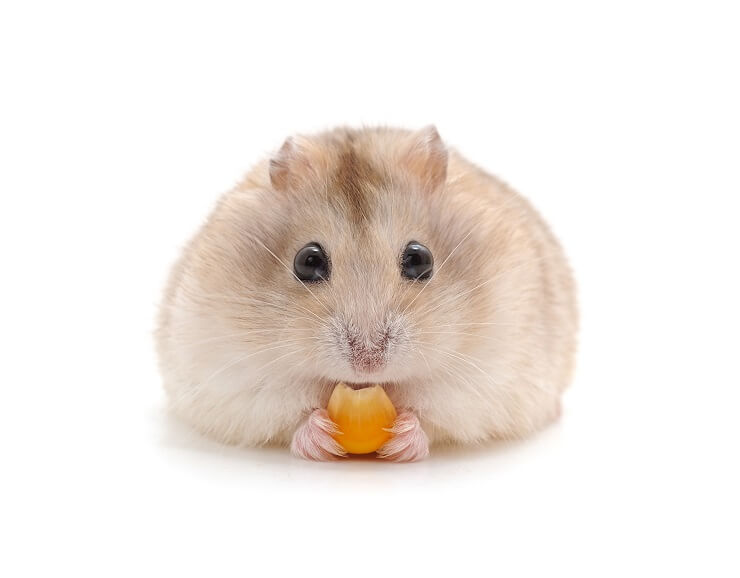
So long as their intake isn’t excessive, hamsters can eat corn as part of their daily ration, since it contains lots of carbohydrates that provide energy for all those busy activities your pet carries out!
On the other hand, if your hammy is struggling with obesity, it might be best to choose a food that has little to no corn. Even a few ounces of excess weight is a lot for a hamster’s tiny joints to handle.
The Correct Diet Is Important
Wild hamsters might never encounter corn but we’re guessing that they’d eat it with tons of enthusiasm if they had the opportunity! So, what does a hamster eat, anyway?
In the wild, hamsters are opportunistic omnivores. They’ll eat everything from tiny plants to seeds to insects, plus lots of things in between! As corn is technically a seed, it’s a pretty good fit for your hamster’s digestive system so long as it’s enjoyed in moderation.
But what about your pet hamster? What should your furry friend be eating every day?
The good news is, you don’t have to catch bugs or put tons of effort into your hammy’s diet.
Here’s what to feed a hamster:
- Fresh hay – unlimited amounts for nibbling and tunneling
- Balanced hamster food (check the package for serving information)
- A 24/7 supply of clean, fresh water; remember to rinse and refill your hamster’s drinking bottle daily
- A teaspoon of birdseed once each week, simply added to your hamster’s dish as a source of healthy fat and trace nutrients
- Little snacks, i.e. tiny amounts of vegetables and fruits (see our list below for inspiration!)
Remember to remove uneaten fresh food from your hamster’s cage so that it doesn’t spoil.
And last but not least, give your hamster plenty of tough, fibrous things to chew on. There are lots of different hamster toys that help your fuzzy friend stay busy while preventing their teeth from growing too long and causing problems.
What Are Other Healthy Alternatives To Corn In A Hamster’s Diet?
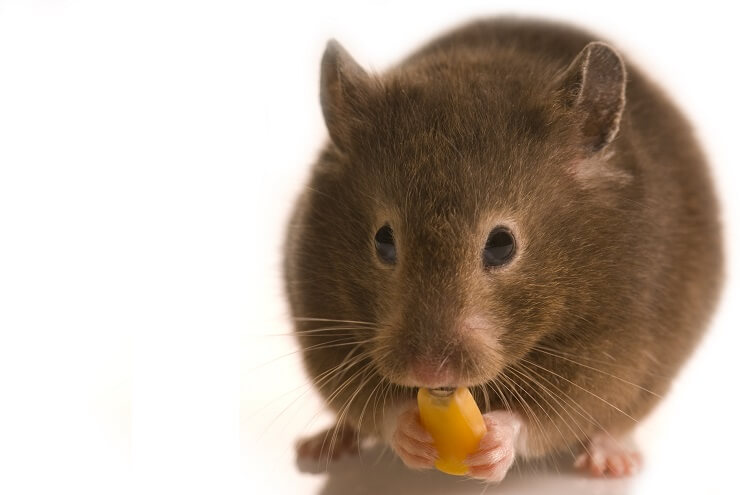
You shouldn’t give your hamster too much corn, which means it probably isn’t the best snack if it’s already included in their hamster food!
The good news is that there are lots of other things your hamster can have instead of more corn.
Next time you’d like to give your hamster a natural treat, try:
- cauliflower
- brussel sprouts
- celery
- green beans
- spinach
- red lettuce
- bibb lettuce
- buttercrunch lettuce
- escarole
- bell pepper
- cucumber
- cabbage
- okra
- winter squash
- pumpkin
- parsnip
- broccoli
- broccolini
- summer squash
- zucchini
- carrot
- carrot tops
- tomato
- sweet potato
- watercress
- yu choy
- bok choy
- artichoke
- basil
- asparagus
- parsley
- cilantro
- mint
- beets
- beet tops
- romaine
- potato (cooked only)
- sprouts
- arugula
- rocket
- endive
- swiss chard
These treats are just the tip of the iceberg. While a few foods are toxic to hamsters, many others are great for them!
Just remember to spend a few minutes researching new additions to your hamster’s diet and you’ll be on the right track. You’ll know what’s safe, plus you’ll find out how much to offer and how often your little hammie should be eating each item.
If it seems like a good idea considering your pet’s health and the ingredients that are already included in their food, giving your hamster corn is a fun way to make their day more interesting – and yummier, too!
Frequently Asked Questions
Is corn safe for hamsters?
Yes! It’s safe to give corn to a hamster but too much too often can contribute to obesity. If your hamster needs to gain weight, corn can be helpful, and you can offer it often – even every day.
Can corn make my hamster sick?
Corn itself isn’t likely to make your hamster sick unless it’s spoiled or unless you feed far too much at once. In the long run though, too much corn can contribute to obesity and diabetes – two common conditions that can shorten a hamster’s life.
Can hamsters have corn husks?
If you have access to organic corn, you can give your hamster corn husk. Offer them a piece that’s about the same size as their head, from the inner portion of the husk closest to the cob.
If you’re not sure where those husks came from, it’s best to avoid them since corn is often heavily treated with chemicals that aren’t good for your hamster’s health.
Can hamsters have corn cobs?
Corn cobs can be amazing natural hamster toys. Make sure they’re completely dried before you give them to your hamster.
Can hamsters have popcorn?
Yes, you can give a hamster popcorn so long as it doesn’t have any butter, salt, or other flavorings on it. As a special treat, you can let your hamster have one piece of popped popcorn and let them nibble away!
Can hamsters have corn chips?
No, you shouldn’t give a hamster corn chips. The added oil, salt, and preservatives aren’t good for your pet.






